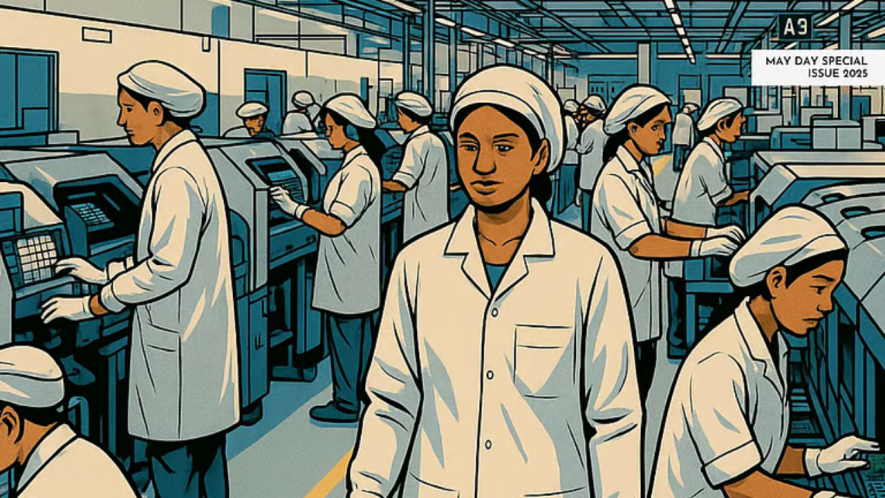Feminisation of Industrial Workplace: Empowerment or Exploitation?

Representational Image.
Post economic reforms, there has been a massive increase in women’s employment, particularly in industries in Special Economic Zone (SEZs). Women have moved from purely unorganised informal sectors, to formal employment sectors like manufacturing and services. Does that mean that women have emerged as an organised work force? Have they been empowered? Unfortunately, no.
There has been a government policy shift from strict enforcement of Labour Laws “to ease of doing business” and “profits”. The new Labour Codes which are yet to come into force talk of voluntary declaration by the employer and almost normalise violations. Collective bargaining has been weakened and in many industries, there are no trade unions. Increased contractualisation of workforce has left workers at the mercy of contractors who do not follow labour laws.
Women workers who emerged into the formal sector in this background are really no winners, being forced to work in sweatshops, in confined spaces, under strict work discipline, under poor working conditions, with heavy workload, facing occupational health and safety hazards and being practically ill-informed of their rights under the Labour Laws.
Let us look at the electronics industries like Samsung and Foxconn. The largest iPhone production factory outside China is run by Foxconn at Sriperumbudur near Chennai, Tamil Nadu. It employs a large number of young women (aged 18-25 years) from rural areas around the factory sourced through recruiting agencies.
Discrimination against married women
After a public outcry over the company’s discriminatory practice of refusing employment to married women, the State government enquired and said that Foxconn employs nearly 42,000 workers and of the 33,360 women workers, 6.7 percent were reportedly married women. No information was available whether they were in the assembly line.
Earlier, a WhatsApp chat between a married candidate and the hiring agency of the company revealed that when the candidate asked about the salary and childcare facility in the factory, the response was “married not allowed”. The company later refuted these reports, but the recruiters removed the marital status from their job advertisements.
On July 1, 2024, the National Human Rights Commission issued a press release stating that the case raised a serious issue of discrimination against married women by violating their right to equality. Referring to the International Covenant on Civil and Political Rights and the International Covenant on Economic, Social and Cultural rights, the NHRC emphasised:
“It is the obligation of the state authorities to ensure that all the companies follow the norms and regulations relating to labour laws and the right to health and dignity of any individual including women, who are working in the supply chain of any production unit of the private sector”
It, therefore, issued notices to the Secretary Ministry of Labour and Employment, Government of India and the Chief Secretary, Government of Tamil Nadu.
Article 11(2) of the Convention on Elimination of All Forms of Discrimination against Women (‘CEDAW’) prohibits “discrimination against women on grounds of marriage or maternity and ensures their effective right to work”. This has to be read into the Equal Remuneration Act, 1976, which translates the right to equality in Articles 14 and 15 towards women’s economic empowerment. The Supreme Court, in C.B.Muthamma v. Union of India (1979), questioned how the government could discriminate against a woman officer in the Indian Foreign Service on the ground of marriage.
Exploitative working conditions
Apart from the discrimination against married women, the working conditions of those at work in the factory smack of exploitation. Can any industry employing a large workforce of more than 40,000, claim to be a fair employer, if there is no independent trade union that can question working conditions or voice the concerns of the workers? The young women at Foxconn work six days a week, eight or more hours per day on a running assembly line, manually soldering components, attaching crucial parts to the motherboard and using their nimble fingers to tighten screws or turning machinery. The assembly line involves a continuous process working three shifts.
Most of the workers are employed through third party contractors with no security of service. Since they are mere contractors, the Industrial Employment (Standing Orders) Act, 1946 that regulates conditions of service does not apply to the majority of the workers of Foxconn who are employed through them.
Production targets are fixed very high according to a report by the TIME magazine. The targets can require each woman worker to work on as many as 520 iPhones per hour - one every 7 seconds, at which rate, each worker would handle nearly $4 million worth iPhones every day. It was reported that the women have to hunch over their repetitive work continuously over eight hours, sometimes even without a restroom break, causing severe pain in the neck, back, shoulder, elbows, wrist and fingers. If she changes position to alleviate the pain and sits crossed leg, the supervisor reprimands her to sit properly and work. The TIME report also said that in extreme pain the workers are given pain medication and asked to continue work.
Women workers who emerged into the formal sector in this background are really no winners, being forced to work in sweatshops, in confined spaces, under strict work discipline, under poor working conditions, with heavy workload, facing occupational health and safety hazards and being practically ill-informed of their rights under the Labour Laws.
The TIME’s report said the contract workers do not get sick leave or even a copy of their contract of employment. If they take leave on a Monday or a Saturday, they suffer a loss of Rs. 1,500/- (equal to 8 days wage) and if they take three days off consecutive leave, the wage cut is Rs. 5000/-.
Safety compromised
Earlier in December 2021, the Joint Director, Industrial Safety and Health, Kanchipuram, Government of Tamil Nadu, conducted an inspection at the Foxconn factory and found several serious violations of provisions of the Factories Act, 1948 and the Tamil Nadu Industrial Establishment (Conferment and Permanent Status to Workman) Act, 1981.
The Inspector found:
-
The workers were not provided with safety goggles to protect their eyes from excessive light and Infra-red radiation.
-
They were not provided with chemical resistant gloves and other protective gear.
-
Women were made to work on manual soldering process, which was highly hazardous to their health.
-
There was poor ventilation to prevent spread of toxic fumes into the working environment.
-
Safety mechanisms were missing that could cause bodily injury -
a. Interlocking mechanisms were not provided for doors of 77 automated machines
b. safety guards were missing in manual pressing machines
c. some machines were not fenced to prevent human contact.
-
Six large industrial ovens were not tested by a competent person before the workers were made to use them
-
Workers were required to work for
a. excessively long hours
b. Work on Sundays without a compensatory day off within three days.
-
All Latrines and urinals were found to be unsanitary.
-
Almost 70% of the workers were not directly employed by Foxconn but by 11 sub-contractors who were not legally registered.
-
The Register of workers and wages was not maintained as per the Factories Act, 1948
-
The forms prescribed under the Tamil Nadu Establishment (Conferment and Permanent Status of Workman) Act, 1981. that gives permanency to a worker on completion of 480 days of work was not maintained.
There is no information about what steps the government took after the inspection report. However, the factory was closed immediately and was re-opened after several weeks. It is not known whether any lay-off compensation was given to the workers. Media reports allude to the company’s claim that all defects have been rectified.
Absence of trade unions and ignorance of rights
The workers are kept completely in the dark. On the other hand, strict discipline is enforced. After the state government constructed a huge hostel complex within the factory campus at an enormous cost with improved facilities for boarding & lodging, certain social media posts have appeared wherein a few women workers have appeared expressing satisfaction over better facilities and they have nothing to complain about. Coming from very poor economic strata, these young women have become wage earners for their families. Their average monthly wage is about Rs 20,000/- which is more than the minimum wage. Even so, can the employer be allowed to get away without complying with statutory obligations to labour, which are minimum guarantees? The very same employer would be paying twenty times more to a worker doing the same job in the USA. Look at the profits earned!
In the absence of any trade union or workers’ rights information, these women remain totally ignorant of their right under labour welfare laws, on their entitlement to casual leave, sick leave, leave with or without wages, maternity benefits, weekly off, hours of work, rest intervals, creche facilities, overtime wages, restrictions on deductions from wages, right to collective bargaining, right to equal remuneration, to bonus or their right against wrongful disciplinary action, all of which are statutorily provided for.
Production targets are fixed very high according to a report by the TIME magazine. The targets can require each woman worker to work on as many as 520 iPhones per hour - one every 7 seconds, at which rate, each worker would handle nearly $4 million worth iPhones every day.
The Industrial Disputes Act, 1947 in the Fifth Schedule lists “unfair labour practice” by employers which are subject to prosecution under Sections 25-T & 25- U. An employer commits an unfair labour practice if any action is taken,
“To interfere with, restrain from, or coerce, workmen in the exercise of their right to organise, from, join or assist a trade union or to engage in concerted activities for the purpose of collective bargaining or other mutual aid or protection”.
A legitimate question arises: why is there no trade union in an industry with such a large body of workers? Who informs these women workers of their rights? The government which has to enforce the labour laws turns a blind eye. On the other hand, it dragged its feet to register a trade union at the Samsung factory near Chennai. Only after the workers moved the Madras High Court did the state government grant registration certificates to the Union affiliated to CITU, which had already raised several demands.
Illegal contractualisation
The Contract Labour (Regulation & Prohibition), Act, 1970 has been interpreted by courts as not to authorise contract labour in perennial jobs, particularly those which are necessary for the production process. Do the women workers know that they are entitled to be regular employees of Foxconn with all the benefits and also to permanent status on completion of 480 days of service as per the Tamil Nadu Act on conferment of permanency?
It is learnt that in March 2025, only about 9600 employees of Foxconn at Sriperumbudur were covered under the Employees Provident Funds & Miscellaneous Provisions Act, 1972, which is hardly one fourth of the total work force. Thus, more than 70 percent of the workforce is engaged through contractors!
A legitimate question arises: why is there no trade union in an industry with such a large body of workers? Who informs these women workers of their rights?
Health and safety compromised
The women workers are not informed of their rights under the Sexual Harassment of Women at Workplace (Prevention, Prohibition and Redressal) Act, 2013. Are they even aware that harassment occurs when a supervisor abuses them verbally with sexual overtones and it is an offence? Any such harassment is a threat to their mental and physical health.
Nothing is more dangerous than ignorance of worker’s rights, particularly in an industry using chemicals and continuous process of repetitive work with exposure to infra-red radiation.
The adverse occupational health effects on women workers in the electronic industries making smartphones is a matter of global concern. Hazardous chemicals are used in the manufacture of smartphones. Many of them have long term impacts on hormonal disruptions, miscarriages, children being born with congenital deformities and increased risk of cancer.
Good Electronics, in its report of March 29, 2024 mentions Samsung, Apple and Foxconn as companies that have been hostile towards trade unions which alone can enable compliance with labour laws and also facilitate worker awareness regarding safety and health training. Good Electronics has also made an extensive report called ‘The Poisonous Pearl’, which came out in September 2016, studying the occupational chemical poisoning in the electronics industries based on the Pearl River Delta in China.
The main Concerns flagged were:
-
Workers are poorly informed about health risks due to exposure to chemicals at work
-
When workers become ill they do not realise that it could be work related
-
Employers do not discharge any obligations in case of such illness
The report mainly found leukaemia and adverse effects on the reproductive health of women workers of electronic industries.
South Korea has recognised congenital diseases among children of women workers of Samsung Electronics as industrial accidents and awarded compensation.
Apple has issued statements that it has banned use of certain toxic chemicals and issued advisories to its manufactures to use chemicals only within safe occupational exposure limits. However, in any industry using chemicals, information on their use and safe exposure limits and health risks have to be shared with the workers. No such information has been shared with the women workers in Foxconn.
Unfortunately, the Schedule III to the Factories Act, 1948 which lists diseases caused due to occupational exposure, does not even list women’s reproductive health issues among the notifiable diseases under Sections 89 and 90.
Lacunae in Factories Act – failure to address women’s health & safety
Unfortunately, the Schedule III to the Factories Act, 1948 which lists diseases caused due to occupational exposure, does not even list women’s reproductive health issues among the notifiable diseases under Sections 89 and 90. The same list has been repeated in the new Occupational Safety Health and Working Conditions Code, 2020.
Severe pain, caused due to postural ergonomics in occupations that demand repetitive movements or bending at work over several hours, causes Musculoskeletal disorders (‘MSDs’). The Factories Act as well as the new labour code is completely silent on this. When Foxconn makes their workers take pain killers to continue to work, it endangers their health further, leading to cumulative trauma, which may have long lasting impact – both physically and mentally. In the USA & Europe, such ergonomic adverse impact due to occupation is also subject to regulatory guidelines.
The women workers of Foxconn who work in captive spaces, are prevented from speaking to media or join any trade union, are forced by economic necessity to work under extreme conditions, with no security of employment. Of greater concern is the exploitation of their health for the sake of the enormous profits. All other companies in SEZs that employ women in large numbers operate under similar exploitative conditions with no collective bargaining and total lack of information to the women workers of their rights or about their health and safety at work.
In a similar scenario in the 1990s, young unmarried girls in the textile industry in Tamil Nadu were employed in large numbers under a recruitment scheme called ‘Sumangali Scheme’. All of them were employed as “Apprentices” and contracts were signed under which they were paid a pittance per day as “stipend”. But their parents were promised a lump sum at the end of 3 years of work, which could be used for their marriage. In practice, the lump sum was completely reduced by enforcing heavy deductions for “toilet breaks” or reporting late or leaves due to illnesses. The girl workers were kept captive within hostels maintained by the employers and subjected to inhuman conditions.
Finding that the Labour department officials were complicit, the Madras High Court issued a direction in a Public Interest Litigation asking the Legal Service Authorities in each district to form a committee including representatives of NGO’s and women’s organisations to interview the workers, inspect & file a report before the High Court. The enquiry exposed the utter exploitation the young women were subjected to. It also found that the entire workforce consisted of “apprentices”!
This in turn forced the government to amend the Industrial Establishments (Standing orders) Act, 1946 to include an “Apprentice” in the definition of ‘workman’ and to notify minimum wages for them. A challenge to the amendment and the minimum wages by the textile industries was rejected by the Madras high Court.
While governments are keen to be investor friendly and generate employment, they cannot turn a blind eye to violation of labour rights too. Women workers’ dignity can be assured only by guaranteeing their dignity of labour.
R. Vaigai is a senior advocate at the Madras High Court
Courtesy: The Leaflet
Get the latest reports & analysis with people's perspective on Protests, movements & deep analytical videos, discussions of the current affairs in your Telegram app. Subscribe to NewsClick's Telegram channel & get Real-Time updates on stories, as they get published on our website.























